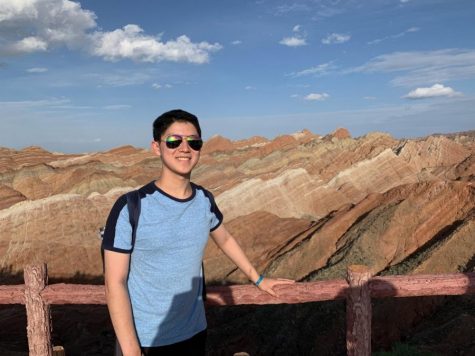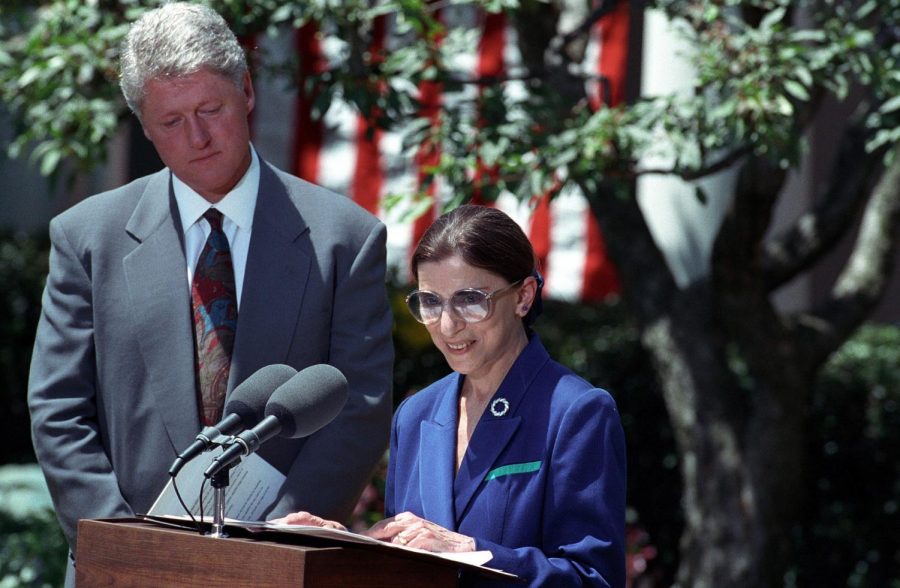Ginsburg Vacancy Sparks Apocalyptic Senate Battle
Memories of a bygone era in bipartisanship: Supreme Court Justice Ruth Bader Ginsburg (right), who passed away September 18, 2020, accepts her nomination from then-President Bill Clinton (left) in June 1993. Ginsburg was confirmed by the Senate with an overwhelming 96–3 vote, but President Trump’s nomination of Amy Coney Barrett to succeed her is likely to start an apocalyptic confirmation battle in today’s hyperpartisan Washington. Photo credits: U.S. National Archives and Records Administration.
Ruth Bader Ginsburg’s death has unleashed a battle in the Senate every inch as fiercely partisan as her life was. The 87-year-old Supreme Court Associate Justice, long cheered by Democrats for her scathing dissents, was a bulwark of the court’s liberal wing, and her passing opens up a third vacancy for President Trump to fill, shifting the court’s balance from a delicate 5-4 conservative majority to a much stronger 6-3 balance. Trump officially nominated stalwart conservative judge Amy Coney Barrett to the seat on September 26, 2020, kicking off the confirmation process in the Senate.
Democrats are particularly outraged about Barrett’s nomination, as in 2016 Senate Majority Leader Mitch McConnell (R-KY) notoriously stonewalled Obama’s nomination of Merrick Garland on the grounds that it was too close to an election to fill the court seat. Garland was nominated to the court 237 days before the election; Barrett has been nominated with only 39 days to go. That seat was later filled by Trump in 2017, going to Associate Justice Neil Gorsuch, but now McConnell’s position has reversed.
Hours after Ginsburg’s passing, McConnell vowed that “President Trump’s nominee will receive a vote on the floor of the United States Senate”, and with the Republican caucus nearly in lockstep behind him, Barrett is highly likely to be confirmed before the Senate turns over on January 3, 2021. Only Republican senators Lisa Murkowski (R-AK) and Susan Collins (R-ME) have expressed disapproval, and McConnell’s 53-47 majority means that he can survive both defections and still confirm Barrett.
The question, of course, is whether Barrett will be confirmed before or after the November 3 election. Senate Judiciary Committee Chair Lindsey Graham (R-SC) unveiled a timeline which aimed for an October 22 committee vote and a full Senate vote before November. Senate Democrats, led by Minority Leader Chuck Schumer (D-NY), have vowed to deploy procedural tactics to delay Barrett’s confirmation, such as invoking the “two-hour rule”, which halts all committee business after the Senate has been meeting for two hours. By all reckoning, however, it will be an apocalyptic battle on the scale of 2018’s Kavanaugh hearings.
The timing is pivotal, as the Supreme Court could be called upon to settle a slew of urgent election-related court cases. The spectre of the 2000 court case Bush v. Gore, when a 5-4 partisan vote controversially handed Florida’s disputed electoral votes and the presidency to George W. Bush, casts a pall over the proceedings. Already, Biden and Trump are both hiring attorneys to dispute election results in key swing states like Michigan, Pennsylvania, and Wisconsin. Complicating the matter is the issue of mail-in ballots, which appear to lean overwhelmingly Democratic, and whether or not they can be disqualified. Another crucial upcoming case is a challenge to the Affordable Care Act, known as “Obamacare”, which is scheduled for November 10.
Regardless of the short-term results, however, Ginsburg’s passing is likely to result in long-term changes to the court. Barrett’s confirmation would seal a 6-3 conservative majority that could hand down rulings stonewalling Democratic legislation for decades, even in the case of a Biden victory in the upcoming election. Trump has also hinted that with Barrett’s nomination, even landmark cases like Roe v. Wade, guaranteeing abortion rights, could be overturned.
In turn, Democrats could be tempted into passing more extreme measures to retaliate, such as abolishing the filibuster, granting statehood to Puerto Rico and D.C., or even “court-packing”, expanding the number of justices on the court as was proposed in 1937 by President Franklin Delano Roosevelt when he was similarly confronted with a vexing conservative court majority. The long-term ramifications of this moment in history could very well be an exponential increase in partisanship, injected in an already hyperpartisan national environment; a far cry from the return to normalcy that Americans seem to be desperately seeking.

Vincent Jiang is currently a senior at West Morris Central High School and President of Journalism Club. Passionate about global affairs, he enjoys writing...






























